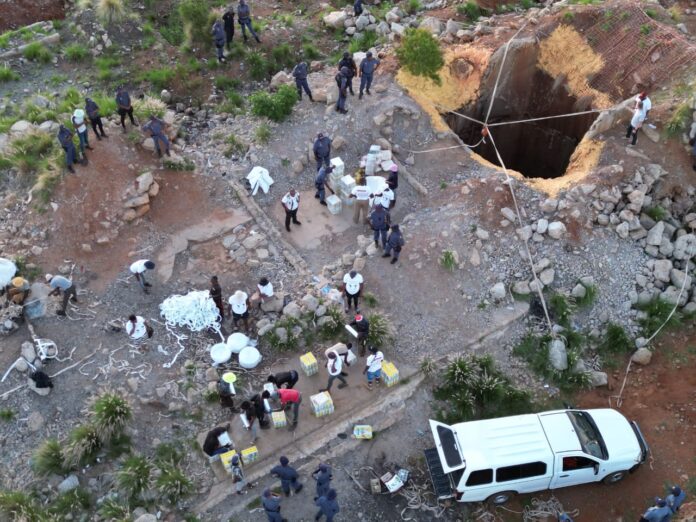Stilfontei, North West – Clement Moeletsi, a community member trapped underground in abandoned shafts at Buffelsfontein Gold Mine in Stilfontein before he was rescued and then arrested – says illegal miners were starving to death.
In an affidavit submitted as part of the Mining Affected Communities United In Action (MACUA) appeal to the Constitutional Court, Moeletsi reveals that: “It was not an illness that killed them. It was starvation”.
Moeletsi, who was arrested on 9 December 2024 was released on R500 bail by the Stilfontein Magistrate’s court on Tuesday (31 December 2024). In the affidavit, Moeletsi gives harrowing details of what he witnessed underground, his rescue and arrest.
“I was unable to give a more detailed account as my legal representatives were denied access to me while I was held at Hartbeespoort Police Station from 9 December 2024 until my release on 31 December 2024,” Moeletsi said.
He said the lack of access severely impeded his ability to communicate and provide critical information during that period.
“Now, having regained my freedom, I am in a position to offer a clear and detailed account of the events and conditions I experienced, which I believe will significantly assist the Court in understanding the urgency and gravity of the situation,” said Moeletsi. “I entered Shaft 10 using the rope system. This system, operated manually by artisanal miners, required coordination and physical effort to lower individuals into the shaft.
“Upon descending to level 6 of Shaft 10, I remained there for approximately one month before the impact of Operation Vala Umgodi was felt.” Moeletsi said during this time he witnessed the daily struggles of life underground. “The environment was suffocating and devoid of natural light, with the air thick and heavy,” reveals Moeletsi.
“Prior to the implementation of Operation Vala Umgodi, we relied on the support of other artisanal miners above ground and community members above ground to send food, medications, and other essential supplies. Families would provide these items, which were then delivered by miners on the surface to those trapped below.
“This system, while informal, was crucial in sustaining life underground. In August 2024, the supply of food and other essential necessities for dignified living from above ground was completely cut off for Shaft 10.”
Moeletsi added: “This abrupt termination of supplies left us utterly blindsided, as we had no warning or explanation for why the provision of food, water, medication, and other basic supplies had suddenly stopped”.
He said around September 2024, desperation for sustenance reached unimaginable levels. “People began eating cockroaches and mixing toothpaste with salt to create makeshift meals, extreme measures born out of sheer deprivation,” said Moeletsi.
“The lack of food and safe drinking water left us with no viable means of nourishment. From September through October 2024, the absence of even basic sustenance was absolute, and survival became a daily battle against starvation.”
“Personally, I went without food or potable water for nearly six weeks. The prolonged starvation left me physically and mentally drained, pushing my body to its limits. To survive, I resorted to drinking underground water, which had a strong chemical taste.
“While it kept me alive, it came at a cost, I suffered severe headaches, abdominal pain, and what I suspect were symptoms of stomach ulcers, brought on by the water’s contamination.”
Moeletsi asserts that operation Vala Umgodi, implemented without warning by the South African Police Service, abruptly cut off any chance of aid or rescue.
In the affidavit, Moeletsi said the impact was devastating. “Starvation took hold swiftly, and I watched as those around me grew weaker by the day,” said Moeletsi.
“Their bodies wasted away, and their conditions deteriorated rapidly. Many succumbed to the unrelenting hunger, their skeletal frames haunting reminders of the horrors we endured. From what I witnessed; it was not illness but starvation that claimed the lives of those underground.”
Moeletsi recalls that the air was heavy with sickness. He said cuts and sores festered, unable to heal. “Coughs rattled through the tunnels as people grew too weak to fight off what appeared to be infections,” said Moeletsi.
“Skin cracked and broke open, leaving them vulnerable to infections they could no longer fend off. Some, like me, drank the underground water to survive, but it brought its own torment causing searing stomach pain and unbearable headaches. This is what I saw underground, people wasting away, their bodies betraying them in slow, agonising defeat.”
In a statement on Saturday, (4 January 2024), MACUA said Moeletsi’s affidavit was part of the documents it submitted to supplement its application at the Constitutional Court to bring attention to the escalation of the degree of urgency in the matter.
*This article, written by Robert Tlapu, first appeared in The Bulrushes.

